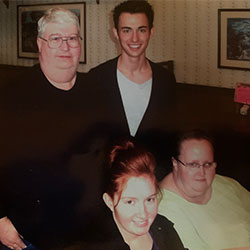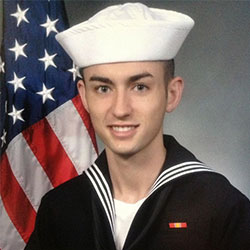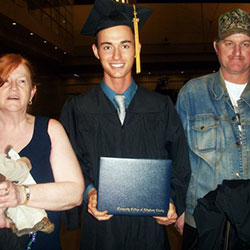Business Student Overcomes Challenging Childhood to Achieve His Impossible Goal
Business Student Overcomes Challenging Childhood to Achieve His “Impossible Goal”
At the formative age of 13, Chris Custer found himself legally emancipated from both of his biological parents. While this wasn’t the end of all of Custer’s challenges, it was the liberating step he needed to move forward with his life.
Currently, Custer is an SDSU junior majoring in general business in the Fowler College of Business and has been able to attend college – something he thought of as “an impossible goal” just a few short years ago – through SDSU’s Guardian Scholars Program.
Established to provide financial, personal and academic support to students who were foster care youth, unaccompanied homeless youth, or (as in Custer’s case) emancipated minors, Guardian Scholars offers these students with specialized assistance to guide them toward their college degree and, ultimately, into the career of their choice.

Custer (standing, right) stayed with the Lawrence family after a judge emancipated him from his parents.
No Sign of Trouble – At First…
Custer’s early years held no sign of trouble. Born in Georgia, he moved with his family
to Pennsylvania before kindergarten. Within a few years, his parents were divorced,
and he was living with his mother, who became increasingly physically and verbally
abusive. The abuse continued to intensify, so he left his mother’s home to live temporarily
with a family friend, the Lawrence’s, while he arranged to move in with his father
and stepmother.
Unfortunately, life with his father and stepmother also proved to be rocky. “I woke up on Easter morning and found all of my stuff packed up by my stepmother,” Custer recalled. “She said I had a bad attitude and she was threatening to send me back to my mother.”
Realizing that living with his mother would be less than ideal, he moved back in with the Lawrence family where he felt like he was able to lead a more normal life.
Unfortunately, this living arrangement also presented some unexpected issues for the 13-year-old Custer. The Lawrence’s were not his legal guardians and - even though they were homeschooling him - they were not able to enroll him in a public school or take him to seek medical treatment. Eventually, both of his biological parents and the Lawrence’s ended up in court to determine a resolution.

Prior to his enrollment at SDSU, Custer was enlisted in the U.S. Navy
Emancipation Offers Step in the Right Direction
During the court hearing, there was another family in the courtroom. A potential foster
family was summoned to attend in case the judge decided to place Custer into foster
care. While Custer and the Lawrence family were comfortable with their living arrangement,
they couldn’t become Custer’s legal guardians since neither of his parents were willing
to pay the child support that would have been legally required of them.
This would have normally made foster care the primary option and with a foster family already present in the courtroom, Custer feared this would be the eventual outcome. However, the judge overseeing the case suggested an alternative: Custer could emancipate from both of his parents, become a ward of the court and he could go home with Lawrence’s that day. To Custer, the choice was a no-brainer, and he resumed his life with the Lawrence family.
After earning his high school diploma, Custer decided that a bachelor’s degree was out of his reach, so he completed a year of community college and underwent training to become a massage therapist. After he earned his certificate and received his license, he worked as a massage therapist in Pittsburgh. Though he liked his job, the pay was low and he was barely making ends meet. This prompted him to join the U.S. Navy with the hopes that he would be able to attend college after his discharge.
No Escape
However, Custer’s Naval service did not offer an escape from his traumatic past. He
became a victim of sexual assault and when he reported the crime, the perpetrator
committed suicide. In the aftermath, Custer found himself without any kind of lifeline.
While Custer’s three-and-a-half years in the Navy left some lasting scars, one bright spot was his first duty station in San Diego. “I immediately fell in love with the care-free culture, Mediterranean climate and gorgeous sunsets,” he said. “I knew I wanted to return to California to earn my bachelor’s degree.” Once he was discharged from military service, he kept his promise to himself and returned to San Diego with his GI Bill benefits to make his dream of attending college possible.

Custer with his biological father and family when he earned is massage therapy certificate
Living the Dream
Once in San Diego, Custer enrolled in community college with the intent of studying
business. “Once I completed my associate’s degree, I began checking out prospective
universities to transfer to,” he noted. “I heard excellent reviews about the Fowler
College of Business and after visiting the campus, I knew I had to apply. In fact,
it was the only application I submitted, and I decided if I was meant to go to SDSU
it would happen. And it did!”
Custer was further encouraged to attend SDSU by connecting with the Guardian Scholars Program, which offered him various resources and a network. “Guardian Scholars is so much more than just a scholarship program – it’s a family to many,” he explained. “I never imagined attending a major university because the price of housing, tuition and other associated costs, so having these stresses alleviated truly makes a world of difference.”
Despite the difficult past Custer experienced, he overcame much of it through his determination to complete his education and make a better life for himself. “I am on track to graduate with my general business degree in May 2021 and then I plan to complete my MBA either at SDSU or at a school on the East Coast before I open my own business,” said Custer, who has now re-established a relationship with his father. “Though I have called California my home for the past four years, I miss being closer to my family, especially my young nieces and nephews who are growing up quickly.”

